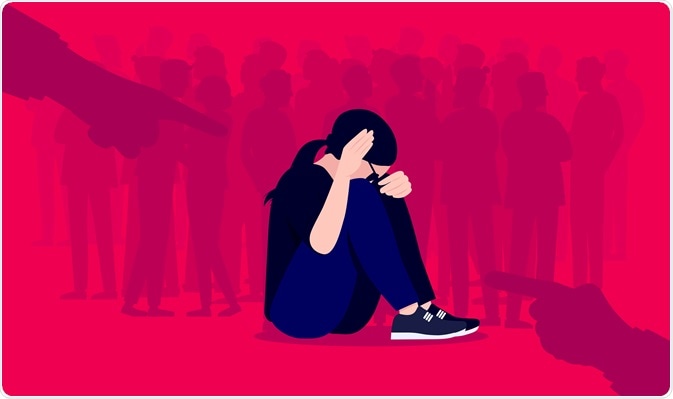The causes of social anxiety are extremely complex and difficult to identify for the psychologist; what may seem like a cause could actually be only a contributing factor.
The factors responsible for social anxiety are broadly classified as:
- Biological causes
- Environmental causes
- Life experiences
 Image Credit: Overearth/Shutterstock.com
Image Credit: Overearth/Shutterstock.comBiological causes
Family history
Anxiety disorders are known to run in the family. An individual with a close relative in the family (parent, sibling, or offspring) who has social anxiety disorder has a 2-3 fold increased risk of developing it.
Genetics
Although no particular gene has been found to be associated with anxiety disorders, studies carried out on twins have shown a very high level of discordance: when one twin exhibits symptoms of a disorder, the other twin is also likely to develop the disorder.
Neurological factors
In some people the portion of their brain that handles anxiety (the amygdala and limbic regions) is hyperactive. Such people are also seen to have deficient production of chemical substances in the brain such as serotonin, dopamine, oxytocin, and glutamate.
Behavioral inhibition
Some growing children present with a group of anxious behaviors such as irritability, crying, moving around, and hiding from new people. Insecure attachment is a kind of behavioral inhibition where children cling unduly to their caregivers or mothers in the presence of strangers. Conversely, some babies may also appear somewhat indifferent and show a very limited range of emotions in responding to their caregivers or strangers. Such children are more likely to develop anxiety disorders in adolescence.
Some children have the tendency to overreact to things, suggesting hypersensitivity. Speed of reactivity is a factor that determines whether people react fast or slowly to things. Those who react fast often show signs of anxiety such as fast breathing and an increased heart rate. Children whose parents have anxiety disorders are more likely to have behavioral inhibition.
Environmental causes
The first environment a child is exposed to is the home. Anxiety could be behavior learned in the family setup. A growing child learns and absorbs things from the environment. Children observe how their parents handle social situations. Acceptable and unacceptable social behaviors are learned from caregivers (either the parents or other family members).
A child learns to expect and experience love and acceptance, or rejection. Early positive experiences bring forth positive outcomes in a child, while parents whose behaviors are overprotective, controlling, abusive, or neglectful have a negative impact on the child, this becoming manifest as avoidance behaviors during adolescence.
People with social anxiety presume that others judge them. However, if growing children have experienced positive evaluations by others in their environment, they can often grow into confident and self-assured people for the most part. On the other hand, if they have been judged too harshly on a consistent basis, they may feel that they are incompetent, and may become anxious to hide away so that others may not spot their weaknesses.
Social Anxiety Disorder - an Osmosis Preview
Life experiences
Some individuals develop anxiety disorders as a result of certain incidents which have traumatized them to a major degree.
Bullying in school
Many people mention bullying in school as the start of their anxiety problems. Children who are bullied in school dislike going to school, feel threatened and isolated, do not experience the world as a just or safe place, experience helplessness, have low-esteem, and perform poorly in academics. Children who witness bullying also often show anxiety issues like fear; they want to help the victims of bullying but feel powerless to do so, and in turn experience guilt for not acting on their behalf.
Adolescent stage
Teenagers have a tough time adapting to their new bodies, mental and emotional changes, and new perceptions of their expected role in the family and in the academic environment. They have to deal with a large range of challenges, which if dealt with positively results in favorable outcomes in later life.
Abuse
All kinds of abuse (emotional, physical, or sexual) are major contributors to anxiety, and without proper counseling, these may lead to long-term social anxiety disorders.
Present stresses
Two important stresses that are associated with anxiety are moving away from a known place, which leads to cutting off ties with family and friends; and a change in the workplace, which often entails role reversals and alterations in the individual’s relations with higher authorities or lower staff.
Technology stresses
Modern technologies require very little verbal contact with people; this may be taken to an extreme to result in a lack of social skills, which could be a source of anxiety when forced to interact with others in a social situation.
Other traumas
A number of other anxiety-causing traumatic incidents include frequent habitat shifts or transfers during childhood years; domestic violence or divorce; previous experience with mental illness; experiencing biases and prejudices such as discrimination based on sex, class, and religion; and addiction to or withdrawal from drugs.
Social anxiety in adults and children
Many of the causes that lead to social anxiety in adults and children are alike. In adults, social circumstances and life experiences are the major influencing factors, while for children genetics and temperament play an important role in how they react to their life environment.
Relationship between causes of anxiety
The causes of social anxiety are interrelated and can be classified as stresses and vulnerability factors.
Vulnerability factors
These are biological and psychological factors whose impact lingers, being active from childhood onwards. Hence, naturally, their effects are more difficult to overcome.
Stresses
Stresses refer to the present-day life problems that affect a person.
Finding the causes of social anxiety is the first step before treatment options can be discussed.
References
Further Reading
Last Updated: Jun 14, 2023